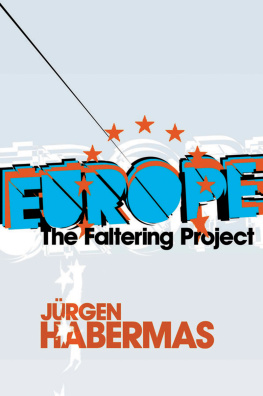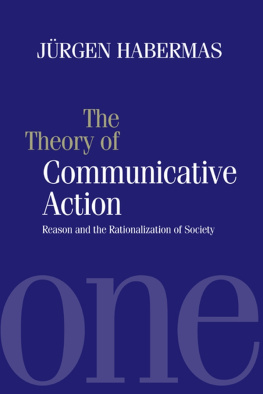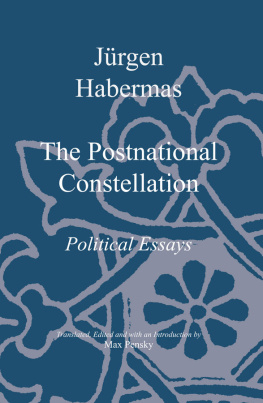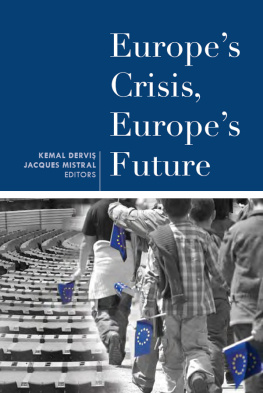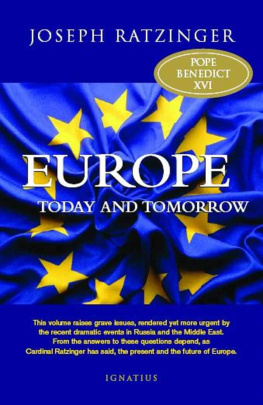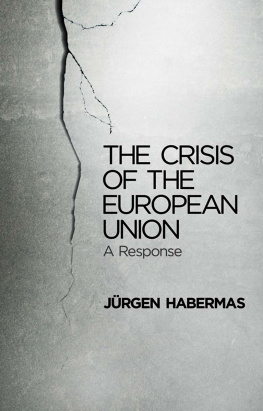
First published in German as Ach, Europa Suhrkamp Verlag Frankfurt am Main, 2008
This English edition differs in some respects from the original German text. Several pieces have been removed and three new pieces have been added: What is Meant by a Post-secular Society? , The Constitutionalization of International Law and the Problems of Legitimating a Constitution for World Society, and the Afterword, Lessons of the Financial Crisis.
Chapter 5, Chapter 7 and Afterword Jrgen Habermas
This English edition Polity Press, 2009.
All rights reserved through Suhrkamp Verlag Frankfurt am Main
Polity Press
65 Bridge Street
Cambridge CB2 1UR, UK.
Polity Press
350 Main Street
Malden, MA 02148, USA
The translation of this work was supported by a grant from the Goethe-Institut which is funded by the German Ministry of Foreign Affairs.
All rights reserved. Except for the quotation of short passages for the purpose of criticism and review, no part of this publication may be reproduced, stored in a retrieval system, or transmitted, in any form or by any means, electronic, mechanical, photocopying, recording or otherwise, without the prior permission of the publisher.
ISBN-13: 978-0-7456-4640-4
ISBN-13: 978-0-7456-4649-7 (pb)
ISBN-13: 978-0-7456-9467-2 (epub)
ISBN-13: 978-0-7456-9374-3 (mobi)
A catalogue record for this book is available from the British Library.
The publisher has used its best endeavours to ensure that the URLs for external websites referred to in this book are correct and active at the time of going to press. However, the publisher has no responsibility for the websites and can make no guarantee that a site will remain live or that the content is or will remain appropriate.
Every effort has been made to trace all copyright holders, but if any have been inadvertently overlooked the publishers will be pleased to include any necessary credits in any subsequent reprint or edition.
For further information on Polity, visit our website: www.politybooks.com
Author's Preface
Today all that remains of Enzensberger's eulogy to European diversity Europe, Europe! is the sighing tone. A discussion with the German foreign minister Frank-Walter Steinmeier provided me with an occasion for further reflection on the future of Europe and for trying to dispel the self-delusion that the danger of the European Union regressing into the all-too-familiar power games of the national governments has been banished by the Lisbon Summit. The course of European unification has been determined until now by the governments. But they now seem to be at their wits' end. Perhaps it is time for them to hand over responsibility for the future destiny of Europe to their peoples. Besides, I make a plea for a bipolar unity of the West. I supplement the main topic with some occasional philosophicalpolitical profiles and with two texts on the role of the public sphere. The final essay is particularly close to my heart. It deals with the structuring influence that a normative theory of the public sphere can have on the design of empirical research. Specialist journals have their problems with this topic because the social sciences and philosophy have drifted further apart than the founders of critical theory could ever have imagined.
Jrgen Habermas
Starnberg, November 2007
Note
See my commentary on this in
Acta Politica 40/3 (2005): 38492.
Translator's Preface
In the interview which concludes this volume, which was conducted as it was on the eve of the recent US presidential election and against the background of a mounting global financial crisis, Jrgen Habermas takes stock of the disastrous consequences of the decades-long dominance of neoliberal economic policy and of the neoconservative radicalization of US foreign policy under the Bush administration. Among the things that set his voice apart from the rising chorus of criticisms of neoliberalism and neoconservatism is his resolutely forward-looking perspective, remarkable in a thinker entering his ninth decade, and the analytic framework he brings to bear on these developments. Perhaps the most important issue these developments pose for him is whether the likely waning of US global dominance will herald a return to major power rivalry in international relations, as the so-called realists would have it, or whether it will prompt moves towards realizing the form of global governance without a world government which he advocates. It may come as a surprise to some readers that Habermas attaches so much importance to another crisis namely the constitutional crisis of the European Union and the stalling of the process of European unification in deciding which of these competing models of global political governance may prevail in the coming decades. Habermas's theoretical engagement with the project of European integration features more or less centrally in most of the essays collected in this volume. But why, one may ask, does he attach so much global political importance to this seemingly provincial concern?
Habermas's writings on European issues must be understood against the background of his cosmopolitan model of global governance, which he contrasts with the realist vision of international relations. Realists argue that international relations are fundamentally anarchic and that a stable international order can be achieved only through a balance of power based on voluntary treaties between sovereign states. Habermas's contrasting model, which is inspired in part by Kant's cosmopolitanism, is predicated on the assumption that the individual and political basic rights on which democratic constitutions are founded also apply in principle to relations between states, organizations, and individuals across national borders. Thus for him the key issue in pacifying international relations concerns the form in which the institutions and procedures of political legitimation familiar from constitutional democracies can be extended to governance above the national level. Although this question remained moot during the post-war period of superpower rivalry, since 1989 at the latest and since the acceleration in processes of globalization across different dimensions of world society the need for new forms of political regulation above the national level has become increasingly apparent. The current financial crisis provides compelling evidence, if such is needed, that economic globalization poses political challenges which can be met only through concerted responses by the international community. Globalized markets have so far outstripped the regulatory competences of even the most powerful governments, and of existing regional and global economic regimes, that inclusive and representative global political institutions provide the only hope of bringing the rampant anarchy under control.
Habermas's proposed model of a future global political order (of which he provides an exposition and defense in ) differs from more idealistic forms of cosmopolitanism in rejecting the goal of a world government that would supersede existing democratic nationstates. A world government is not viable because no single regime could possibly master the complexity of the matters in need of regulation not to mention the problems raised by the diversity of languages, cultures, religions, and traditions within world society. It is not a normatively desirable goal either, because existing nationstates (or, at any rate those with more or less democratic constitutions) have a prima facie claim to continuing to exist as the legitimate representatives of their populations (and as the expressions of their national histories, traditions, and cultures). Thus a viable global political order will have to comprise at least two levels: the
Next page
